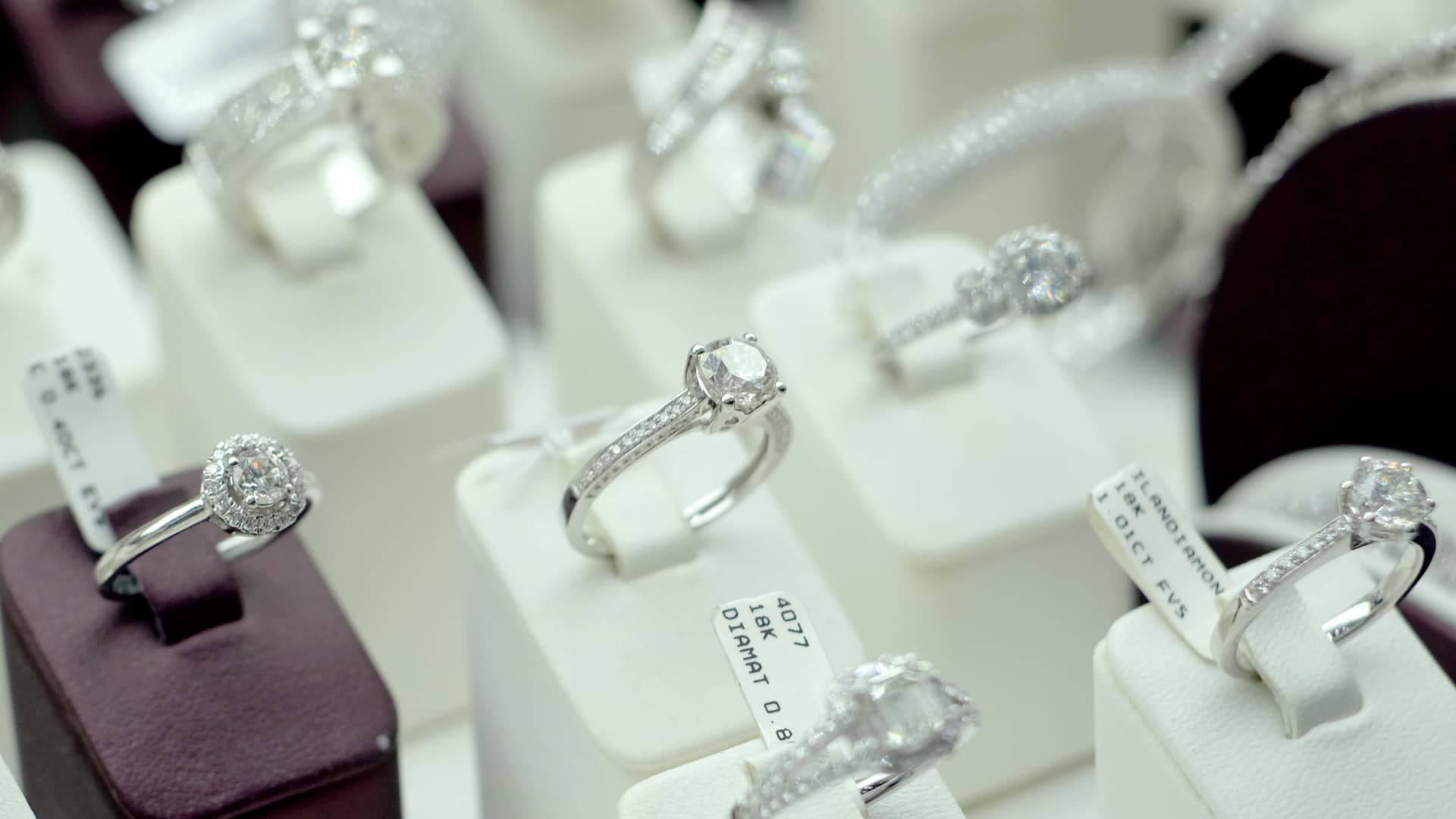Products You May Like
“Diamonds are a girl’s best friend,” as the old song goes.
But they’re not an investor’s favorite currently, with the precious gems losing some significant value over the last few months.
Diamond prices are down 18% from their all-time highs in February 2022, and are lower 6.5% year-to-date, according to one Global Rough Diamond Price Index. And their value is about to dive further, market watchers predict.
“A slightly better-than-average-quality 1-carat natural diamond was $6,700 a year ago, today this same diamond is selling for $5,300,” Paul Zimnisky, the CEO of Paul Zimnisky Diamond Analytics, told CNBC.
Diamonds, alongside other jewelry, saw elevated prices during the Covid-19 pandemic which culminated in a peak early last year.
“Consumers were ready to spend,” management consulting firm Bain & Company said in a report dated February last year. “They were flush with cash from buoyant capital markets and economic stimulus programs, and eager to spend it on meaningful gifts for their loved ones,” they said.
When people could not travel or eat out, all of that excess money went into luxury goods and jewelry, said CEO of Angara Jewelry Ankur Daga.
And when the economy started opening up again, diamond prices started moderating, and slid into a “steep decline,” he added.
Continued competition from man-made diamonds, a slower Chinese economic recovery and an uncertain macroeconomic backdrop are also drivers of a lackluster market, according to industry experts.
A ‘perfect substitute?’
An increasing amount of consumers are turning to lab-grown diamonds, said Edahn.
“The share of lab grown diamond sales versus natural diamonds is rising. In 2020, they were just 2.4%. In 2023 to date they are already up to 9.3%,” he said.
Lab-grown diamonds are made in a controlled environment using extreme pressure and heat that recreates how natural diamonds are forged hundreds of kilometers in the Earth’s mantle.
They are chemically, physically and optically identical to natural diamonds, and are deemed to be a “perfect substitute,” Daga said. But more importantly for most — they are a lot cheaper.
And more people are turning to them for their choice of engagement rings.
“Lab is indistinguishable over mined diamond, and if I can get a bigger diamond for the same price, why not?” said 29-year-old Singaporean Jonathan Lok, who proposed to his fiancée with a 0.76 carat lab-grown diamond ring late last year.
He added that his fiancée had specified for a smaller diamond, and did not want him to spend an exorbitant amount on the ring.
Prices of lab-grown diamonds have been “nosediving,” said Edahn Golan, the CEO of Edahn Golan Diamond Research & Data, with prices sinking 59% in the last three years.
“Three years ago, you would be able to buy a lab grown equivalent 20% to 30% off of the natural price. Now it’s anywhere between 75% and 90% off natural prices,” Daga said, attributing the cheaper prices to machines becoming more efficient in producing more man-made diamonds.
The lab-grown diamond industry, which is energy-intensive, have also been seeing soaring energy costs taper off from its peak.
In the bear case scenario, he expects natural diamond prices to record a drop of between 20% to 25% from current prices in the next 12 months, which would mark a 40% drop off the February peak. And Daga is not alone.
“There is room for continued price declines, and that is a very likely scenario, especially since retailer margins for lab grown diamonds are especially high, around 60% compared with 34% for natural diamonds,” said Golan.
However, even so, the plunge could eventually hit a “natural floor” due to labor costs.
“Labor costs have been going up still, and labor is still a very critical part of producing the diamond. So there is a natural floor somewhere,” Daga said, adding that a flatline will follow after a 25% drop.
The middle-market stage of diamond production involves the cutting and polishing of the diamond before fashioning it into jewelry, which is the “most complex” and extensive portion of the value chain, according to Bain & Company.
Sanctions on Russian diamonds
Additionally, diamond market watchers are not expecting sanctions on the world’s leading producer, Russia, to lead to severe price spikes.
Earlier in May, the G7 economies convened a discussion on imposing sanctions on Russian diamonds, with the United Kingdom taking the lead in sanctioning Russia’s state-owned company Alrosa.
“The Russians have ramped up diamond sales in recent months in an attempt to claw back market share lost last year following the disruption in trading,” Zimnisky stated.
Russia is the world’s largest producers of diamond, followed by Botswana and the Democratic Republic of Congo, according to the Diamond Registry.
According to Edahn, Russia will face no issues selling its diamonds despite the sanctions, especially if the larger buyers continue to take a shine to Moscow’s prized stones.
“Countries like India, UAE, and even the EU, didn’t place sanctions on rough diamond imports. So again, no real shortages,” he said.
India is the world’s top diamond importer, with the U.S. coming in second, followed by Hong Kong, Belgium and the UAE.
